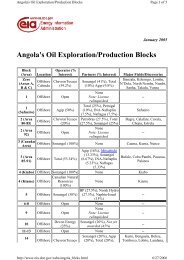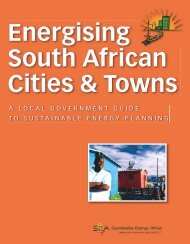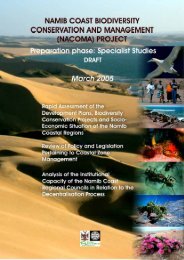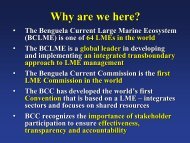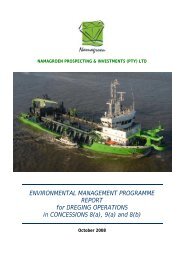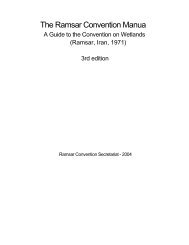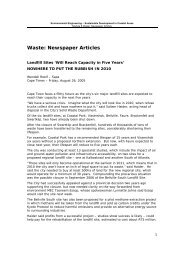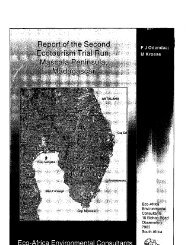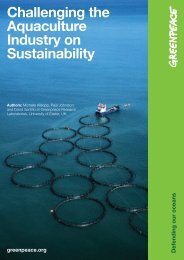Feasibility Study of Proposed Tourism Dev in Shewula, NE ...
Feasibility Study of Proposed Tourism Dev in Shewula, NE ...
Feasibility Study of Proposed Tourism Dev in Shewula, NE ...
You also want an ePaper? Increase the reach of your titles
YUMPU automatically turns print PDFs into web optimized ePapers that Google loves.
Chapter 1 - Introduction<br />
1.4.2.2. General criteria for feasibility<br />
In order for the project to achieve the above goal, it is important to ensure the<br />
feasibility <strong>of</strong> the project from a number <strong>of</strong> perspectives, <strong>in</strong>clud<strong>in</strong>g the sociological,<br />
environmental and bus<strong>in</strong>ess perspectives.<br />
a) Sociological criteria<br />
The degree to which a community-based tourism development has the broad-based<br />
support <strong>of</strong> the local community will <strong>in</strong>fluence its feasibility on sociological grounds.<br />
Legitimate support for such a project can only occur, when the community has the<br />
ability to make <strong>in</strong>formed decisions regard<strong>in</strong>g the desirability <strong>of</strong> such a venture. Such<br />
<strong>in</strong>formed decisions are dependent on general awareness about the proposed<br />
development and an understand<strong>in</strong>g <strong>of</strong> the benefits that such a development could<br />
have for the community, as well as the nature and extent <strong>of</strong> the costs that the<br />
community could <strong>in</strong>cur. If a tourism development is to be sociologically feasible it<br />
must provide the local community with significant benefits, which outweigh the costs<br />
<strong>of</strong> the development to the community as a whole and its <strong>in</strong>dividual members.<br />
S<strong>in</strong>ce the proposed project is touted to be a <strong>Shewula</strong> community <strong>in</strong>itiative, the<br />
community must have a sense <strong>of</strong> ownership about the project. The ability <strong>of</strong> the<br />
<strong>Shewula</strong> community to effectively take part <strong>in</strong> all stages <strong>of</strong> the project is therefore<br />
central to its feasibility. Inadequate participation <strong>of</strong> community, especially dur<strong>in</strong>g the<br />
plann<strong>in</strong>g stages could severely underm<strong>in</strong>e the viability <strong>of</strong> the project.<br />
The ability <strong>of</strong> the <strong>Shewula</strong> community to properly manage the distribution <strong>of</strong> benefits<br />
result<strong>in</strong>g from the development, is an aspect <strong>of</strong> the sociological feasibility <strong>of</strong> the<br />
development's beneficial economic impacts.<br />
b) Environmental criteria<br />
The environmental feasibility <strong>of</strong> a tourism development is dependent on the extent to<br />
which the receiv<strong>in</strong>g environment (both natural and socio-cultural) is able to withstand<br />
the impacts <strong>of</strong> the development without be<strong>in</strong>g significantly underm<strong>in</strong>ed.<br />
c) Bus<strong>in</strong>ess criteria<br />
The f<strong>in</strong>ancial feasibility <strong>of</strong> the proposed tourism development will depend on and be<br />
<strong>in</strong>fluenced by a number <strong>of</strong> factors, <strong>in</strong>clud<strong>in</strong>g:<br />
• a suitable target market, and marketable assets that will appeal to the identified<br />
target market;<br />
• access<strong>in</strong>g the target market and successfully market<strong>in</strong>g the tourism product; and<br />
• the f<strong>in</strong>ancial outputs (eg. revenue, pr<strong>of</strong>its and turnover) exceed<strong>in</strong>g, or <strong>in</strong> the<br />
break-even scenario equat<strong>in</strong>g with, the <strong>in</strong>puts (eg. capital, labour, operat<strong>in</strong>g costs<br />
and assets) that are associated with the tourism development.<br />
1.4.2.3. Specific assumptions relat<strong>in</strong>g to <strong>Shewula</strong><br />
• That the <strong>Shewula</strong> community is a relatively poor community, 23 located with<strong>in</strong> a<br />
region that is characterised by higher rates <strong>of</strong> poverty than other areas <strong>of</strong> the<br />
country 24 This situation has been exacerbated <strong>in</strong> recent years, with the<br />
community suffer<strong>in</strong>g economic losses as a result <strong>of</strong> drought and cattle raids.<br />
23<br />
See orig<strong>in</strong>al proposal, Appendix 5.<br />
24<br />
M<strong>in</strong>istry <strong>of</strong> Economic Plann<strong>in</strong>g and <strong>Dev</strong>elopment (MEP&D) 1997-.Swaziland Poverty Assessment by the Poor,<br />
MEP&D.



